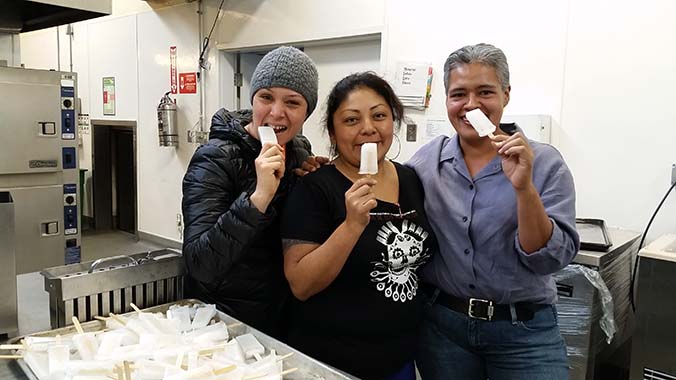By Clair A. McDevitt, writer

Since Benjamin Franklin launched the first mutual fire insurance company in 1752, the cooperative sector has seen waves of success in the United States. Dairy and cheese coops were first organized in the early 1800s, and other agricultural cooperatives followed. By the Great Depression, cooperative businesses were developing in urban and rural areas, bolstered by President Roosevelt’s New Deal legislation. In the late 1960s and 1970s, a new wave of consumer food co-ops grew out of the counterculture movement. In 1981 Capital Impact was born out of federal legislation to keep up that momentum. And for the last four decades, Capital Impact has sought to do this through a mix of financing, capacity building and technical support.
“Co-op development is evolving and picking up steam with an excitement that we haven’t seen in decades,” says Alison Powers, program officer of cooperative development at Capital Impact Partners. “We’re seeing growth in food and worker co-ops as well as bigger attendance at national co-op conferences and more investors entering the co-op conversation. Co-ops solve problems and empower people around a lot of issues.”
To meet the needs of the growing cooperative market, Capital Impact Partners will be expanding its programs and increasing its co-op lending over the next five years. Working with loan funds and CDFI partners is a big part of this strategy, says Powers.
“We’re also involved in national conversations and working groups around opportunities for growth,” she says. “One area that we are excited about is worker co-op conversions, retiring baby boomers are selling their businesses and hopefully they will choose to sell to their workers. We’re working with partners to bring the field to scale, and we’re very excited about the next few years.”
To further this work and expand its outreach, Capital Impact Partners created the Co-op Innovation Award in 2015, providing grants to organizations that support food, worker and housing co-ops in underserved communities. Democracy at Work Institute (DAWI) and United States Federation of Worker Cooperatives (USFWC) were the first two recipients, each receiving $20,000.
With the first year of the awards completed, the recipients are excited to share about their projects’ successes.
Democracy at Work Institute
The grant from Capital Impact supported DAWI’s Conversion Collaboration, a national effort designed to help small businesses transition to worker-owned co-ops.
“Conversions offer an opportunity for worker co-ops to grow to scale in the U.S. and that’s something we are looking at strategically,” says Powers. “The work DAWI is doing aligns with our strategy on a larger level, and choosing them as a grantee was a great opportunity for everyone.”
“The award opened up more possibilities than we anticipated,” says Melissa Hoover, DAWI executive director. “We’ve seen a massive amount of interest in worker co-op conversions from other organizations, capital providers, local governments and even civil rights groups. And we’re gaining a better understanding of the challenges we need to address.”
Capital Impact recently announced the second round of Co-op Innovation Awards, and DAWI was selected again in 2016.
“The second year of funding is really important to us,” says Hoover. “It’s going to help us use the tools and research we did with the first year of funding to implement a clear strategy, specifically conversions in the minority-owned legacy business community.”
Since its launch, DAWI has focused on developing metrics, such as job quality. “One of our goals is to influence the field of economic development and community development, and to influence policy makers,” says Hoover. “By pointing to data, you can illustrate the real impact. Also, you can’t track what you don’t measure. The act of measuring sets our compass. If we measure job quality, for example, then that’s what we will foster. One of the best ways to set an intention is to commit to measuring it.”
The intensity of interest in worker cooperative conversions surprised Hoover. “It’s exciting to see interest from many different quarters,” she says. “We heard from economic development people from the City of Miami and a representative from a national civil rights group,” she says. “We were also invited to do a live chat on Forbes.com. We’re seeing a large breadth and range of interest.”
And the future looks bright. “I’m excited to see cooperative conversions at larger scales, whether that means the size of business converting or that there are more and more of them,” says Hoover. “If we can provide models and support, this idea has potential to gain a momentum of its own to be self-generating and sustaining.”
United States Federation of Worker Cooperatives

“We’ve heard from lending partners that there aren’t as many deals in the pipeline for successful worker co-ops trying to expand, and that’s one reason we were excited to support the USFWC,” says Powers. “Their members had told them they needed this kind of funding. This program is a direct response, and supporting the US. Federation is a perfect fit.”
“We were spot on with the fact that people need loans for growth, but we learned that we had to reorient and go deeper,” says Amy Johnson, Co-Executive Director for the USFWC. “I have to remind myself that this is a pilot program, and we don’t have all of the resources to help everyone. We are working to address the needs of three specific organizations, and we’re hoping with each comes lessons that we’ll learn to support future programs. We’re staying grounded in knowing that this program is making a contribution to an ecosystem that is growing.”
A small organization, Johnson says the grant has enabled USFWC the time and space to think about how to provide the most benefit and value.
“At the core, we’re a connector and base builder,” she says. “We’re reorienting around how a federation can be a network of advisors rooted on the ground in a community. We have great experts across the country, but what doesn’t work is to fly in for an intensive training and leave. It’s about who stays on the ground and who is doing the work, and that requires a long-term relationship over time. Our contribution is figuring out how to support a network of locally rooted and national experts.”
Co-op Strategy for the Future

The Co-op Innovation Award represents just one part of Capital Impact’s strategy to promote food, worker, and housing co-ops that support underserved communities. The organization also provides direct capital to food co-ops looking to grow and expand through its National Co-op Grocers Development Cooperative Loan Fund. Over its 30-year history, Capital Impact has disbursed more than $283 million dollars in financing to more than 200 cooperative businesses that serve close to one million customers.
“The convergence of the growth of worker co-ops and a wave of retiring small-business owners offers a unique opportunity that is attracting the attention of foundations and investors previously unfamiliar with co-ops,” says Powers. These award winners are leading the charge in building a nationwide ecosystem for worker co-op conversions with a focus on low-wage jobs. This aligns with our strategic focus on stabilizing low-income communities and increasing cooperative growth nationwide.”
[dcwsb inline=”true”]







